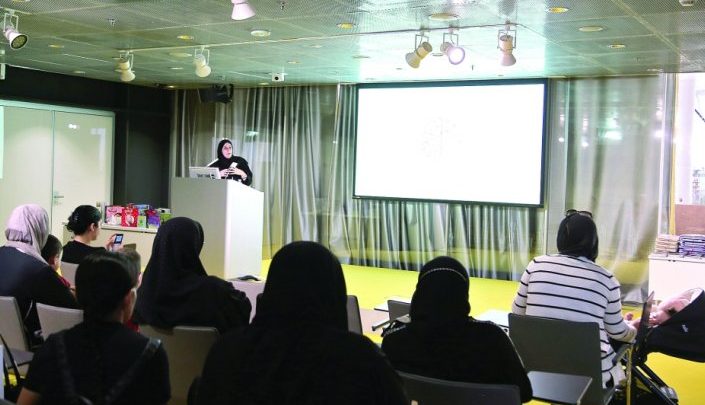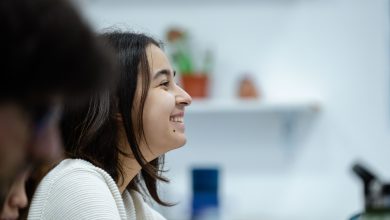
Qatar National Library marks International Literacy Day
المكتبة الوطنية تدعم القراءة خلال اليوم الدولي لمحو الأمية
The Qatar National Library (QNL) marked International Literacy Day with a series of public lectures highlighting the importance of a literate world.
The theme of the International Literacy Day 2019 was “Literacy and Multilingualism,” recognising that embracing linguistic diversity in education and literacy development is central to addressing literacy challenges and to achieving the UN Sustainable Development Goals.
In keeping with the theme, the Library hosted “International Literacy Day: Our Children and Books” on September seven, attended by parents, educators and professionals in the area of child development. The event sought to emphasise the importance of establishing an early relationship with books to give children a head start on the path of lifelong learning.
The lecture focused on early childhood development and highlighted how children are naturally drawn towards printed material. Senior librarians presented simple but effective ideas on how to build a home library and tips to encourage reading throughout everyday family life. Participants learned how to evaluate and understand different books and to appropriately support their children in selecting reading material.
On September eight, the Library presented a lecture in collaboration with the Qatar National Commission for Education, Culture and Science. In “Literacy and Multilingualism: Future Prospects,” Dr. Hassan Ali Diba addressed Qatar’s efforts to combat illiteracy while highlighting the importance of learning languages throughout history. He also discussed the impact of technological progress on the literacy of future generations.
The lecture was followed by an introduction to the Mango Languages interactive database, which provides step-by-step lessons in more than 70 languages, including Arabic, Spanish, French and Russian.
Saleh Hamad Al Nabet, a high school student who attended the lecture, said, “The lecture was very helpful and gave me insights on how to improve my English skills by using the Mango Languages application and other online resources provided by the Library for free to members.”
Mohammed Ali Al Buridi, another participant at the event, said: “The event was very useful. I learned about the Library’s valuable electronic resources, which I will use to expand my knowledge and improve my language abilities.”
احتفلت مكتبة قطر الوطنية باليوم الدولي لمحو الأمية بسلسلة من المحاضرات العامة التي أكدت أهمية التعليم واكتساب الأطفال لمهارات القراءة والكتابة في وقت مبكر من عمرهم.
يركز اليوم الدولي لمحو الأمية لعام 2019 على موضوع “محو الأمية وتعدد اللغات” لتسليط الضوء على أهمية التنوع اللغوي في المنظومات التعليمية واكتساب مهارات القراءة والكتابة وتأثيرها الجوهري في مواجهة تحديات محو الأمية وتحقيق أهداف الأمم المتحدة للتنمية المستدامة.
ونظمت المكتبة في هذا الإطار محاضرة بعنوان “أطفالنا والكتب-اليوم الدولي لمحو الأمية” شارك فيها أولياء الأمور والمعلمون والمهتمون بمجال تعليم الأطفال، كما تناولت المحاضرة التي قُدِّمت باللغة العربية أهمية تكوين علاقة وطيدة بين الكتب والأطفال منذ سن مبكرة حتى يتسنى للطفل أن يشق لنفسه مسارًا للتعلم يجني ثماره مدى الحياة، في حين ركّزت المحاضرة على نمو الأطفال في المراحل المبكرة من أعمارهم وانجذابهم بشكل طبيعي للمواد المطبوعة. وقدم أخصائيو المكتبة خلالها أفكارًا سهلة التنفيذ حول كيفية بناء المكتبات المنزلية وتشجيع الأطفال على القراءة في الحياة اليومية للأسرة، كما تعلم المشاركون من المحاضرة كيفية تقييم الكتب، وفهم أنواعها المختلفة، والقدرة على دعم أطفالهم في انتقاء الكتب المناسبة لهم .
كما قدمت المكتبة فعالية بالتعاون مع اللجنة القطرية الوطنية للتربية والثقافة والعلوم بعنوان “محو الأمية وتعدد اللغات” قدم فيها الدكتور حسن علي دبا محاضرة عامة حول جهود دولة قطر في مكافحة الأمية وبيّن أهمية تعلم اللغات عبر التاريخ وتطرق إلى عدة محاور منها دور اليونسكو في هذا الجانب والتحديات التي تواجه اللغات المعاصرة، بالإضافة إلى الآفاق الجديدة في ظل التقدم التكنولوجي المستمر والدور المأمول للجان الوطنية ومنظمة اليونسكو لمحو أمية الأجيال القادمة. وأعقب المحاضرة شرح تفصيلي حول كيفية استخدام المصدر الإلكتروني “مانجو Mango” لتعليم اللغات الذي يستطيع أعضاء المكتبة استخدامه مجانًا ويقدم دروسًا تفصيلية متدرجة لتعلم أكثر من 70 لغة، منها العربية والإنجليزية والإسبانية والفرنسية والروسية.



